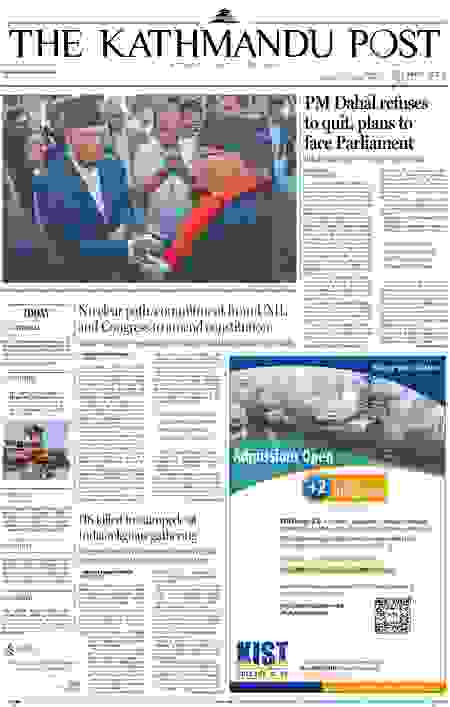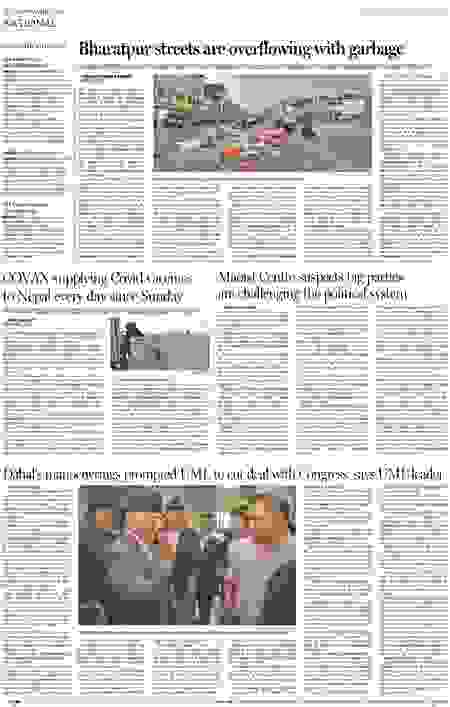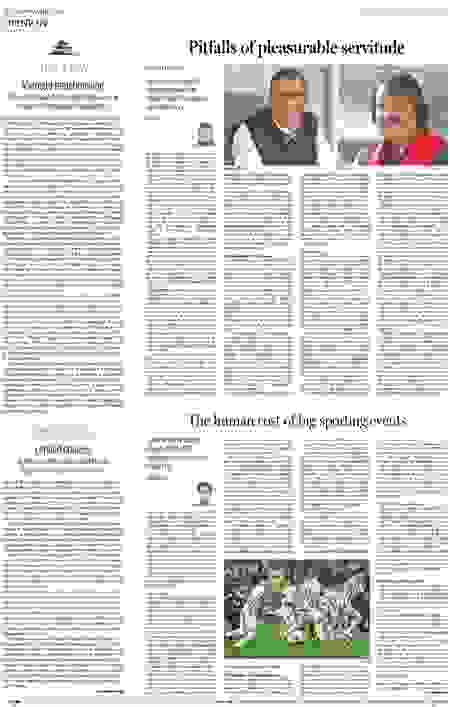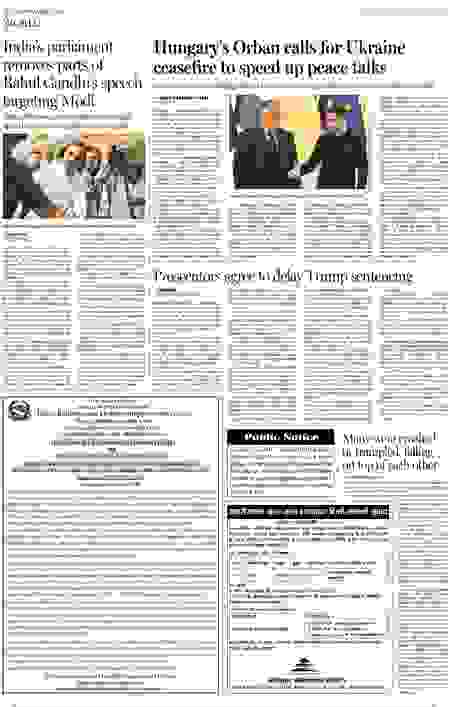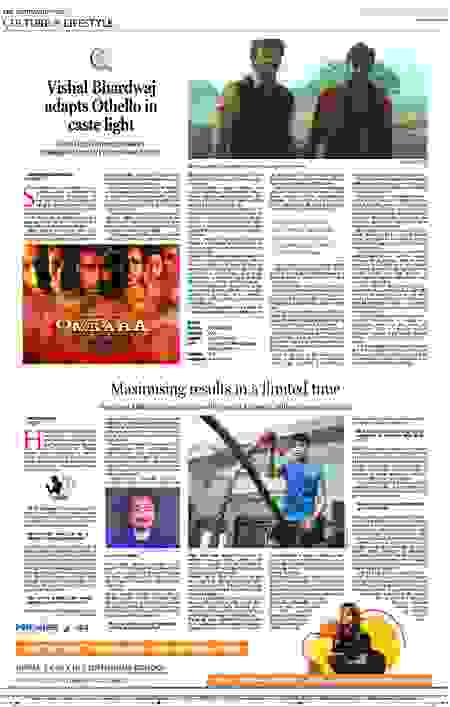HOME PAGE
PM Dahal refuses to quit, plans to face Parliament
UML demands the prime minister resign by today.
- ANIL GIRI
Kathmandu,
A day after the Nepali Congress and the CPN-UML sealed a deal to form a new political alliance and decided to amend some provisions of the constitution, Prime Minister Pushpa Kamal Dahal, who was largely left out of the new power-sharing process, has refused to step down from the post.
The political fraternity has been divided over the new understanding between the Nepali Congress and the UML. But the prime minister’s decision to cling on and seek a vote of confidence is set to delay the process of forming a new government, which will be led by UML chairman KP Sharma Oli as per the understanding.
On Tuesday, a UML secretariat meeting requested all political
parties to join the new government of ‘national consensus’ and contribute to political stability.
As per the Congress-UML understanding to form the government under Article 76 (2) of the constitution, the UML meeting also called on the prime minister to pave the way by Wednesday evening.
“The meeting endorsed the agreement reached between the Congress and the UML,” Pradeep Gyawali, deputy general secretary of the UML, said after the meeting.
Contrary to widespread expectations, the UML has decided to delay its earlier plan to immediately recall ministers from the Dahal Cabinet.
“We don’t want more animosity [against the Maoist Centre] and so we did not recall our ministers today,” Gyawali said. “But if the prime minister does not pave the way for new government formation by tomorrow [Wednesday] evening, we will recall our ministers and take other necessary steps.”
“If the prime minister ignores UML’s request [to quit], our party will withdraw its support to the government.”
The party has eight ministers in the Dahal Cabinet.
The UML has also given a reason for its decision to sever ties with Dahal.
“The prime minister was in talks with the Congress for a month in order to form a national consensus government, which created a situation of mistrust,” said Gyawali. “This ultimately forced us to initiate talks with the Nepali Congress.”
After Congress rejected Dahal’s proposal, the UML and Congress started talking seriously to unseat Dahal, according to Gyawali.
“The UML and the Congress started talking and decided to move ahead together for political stability and democratic exercise,” he said.
The UML meeting also endorsed the understanding with the Congress, expressing hope that a new government would ensure political stability, help mend the crisis-ridden economy, and address growing public frustration.
Gyawali said his party had no plans to ditch the current coalition despite some internal issues.
“We were prepared to give continuity to the government. But some interesting developments started unfolding in national politics. The prime minister started discussions about forming a national government without consulting anyone, prompting us to question the objective and necessity of such a government,” said Gyawali.
He also recounted Dahal’s history of kicking out the UML from the government within just 15 days of government formation last year.
“So we became suspicious of the prime minister,” said Gyawali, “But Nepali Congress did not accept the prime minister’s request this time.”
As the picture of the new government remains unclear, there is also confusion over Cabinet formation and discussions about power-sharing between the Nepali Congress, UML and other parties.
“On Cabinet formation, we have reached a broad understanding with the UML, but we are yet to finalise the names of ministers,” a Congress office bearer told the Post.
Besides the UML, the Congress has also separately asked the prime minister to step down.
On Monday midnight, Nepali Congress chief Sher Bahadur Deuba and UML chair Oli also agreed to form a high-powered constitution review committee to suggest amendments to the constitution, bypassing key ruling partners like the CPN (Maoist Centre) and the Rastriya Swatantra Party.
Besides the Nepali Congress and the UML, other parties like the Rastriya Prajatantra Party, Loktantrik Samajbadi Party, Janata Samajbadi Party (Upendra Yadav faction) have welcomed the new deal.
Deuba, according to one Congress leader, also met CPN (Unified Socialist) chair Madhav Kumar Nepal on Tuesday evening and asked him to join the new political process.
Nepal responded that he would discuss the matter in the party.
The CPN (Maoist Centre), the Rastriya Swatantra Party, and the CPN (Unified Socialist) have opposed the deal. The RSP, a key party in the government, said that it would remain in the government so long as the prime minister stays in office.
After the deal with the Congress, Oli met Prime Minister Dahal on Tuesday morning and asked him to step down, but Dahal refused to do so, according to Maoist Centre leaders.
Dahal, after meeting Oli, convened a meeting of the party’s secretariat, where he discussed the latest political situation and updated party leaders on his interactions with Oli and Deuba in the past few days.
Devendra Poudel, the Maoist Centre party secretary, said it has been decided that the prime minister will not resign and he will instead seek a vote of confidence in the House.
In the meeting, Dahal was reportedly angry with Oli, whom Dahal accused of betraying him.
“Deuba showed political culture, but not Oli,” Dahal said in the meeting. “I didn’t expect such a move from Oli with whom I had very cordial talks even until Monday afternoon.”
“We are not escaping, and we are not afraid,” said Devendra Poudel. “We have decided to deal with the situation politically.”
Dahal went to meet President Ram Chandra Poudel on Tuesday and informed the President that he would follow the constitutional course.
Dahal advised the President to call for government formation based on Article 76 (3) of the constitution, according to which the leader of the single largest party in the House of Representatives—Deuba in this case—will be called to form a new government.
The Maoist Centre has also objected to the understanding between the Congress and the UML on amending the constitution, terming it a ‘regressive’ step.
Dahal told the President that he would follow the constitution, which means he will face a no-confidence motion in the House. As per Article 100 of the constitution, the prime minister will have 30 days to seek a vote of confidence.
When the decision to withdraw support reaches Parliament, the date for seeking a vote of confidence will be fixed as per parliamentary regulations.
“Seeking a vote of confidence is the prerogative of the prime minister and so he is not bound to resign,” said Bipin Adhikari, an expert on constitutional matters. “Tendering resignation is his choice but seeking a vote of confidence within 30 days of a party withdrawing support is his constitutional right.”
A senior UML leader told the Post that Oli wants to be the prime minister under Article 76 (2).
If no political party commands a majority in the House, the President can call for government formation under Article 76 (2).
“In cases where no party has a clear majority in the House of Representatives under clause (1), the President shall appoint as the Prime Minister a member of the House of Representatives who can command a majority with the support of two or more parties representing the House of Representatives,” says the Article.
The spirit of this Article is to provide a strong and stable government, said Adhikari, and so the President can call for government formation under this Article.
“We are consulting on what to do and exploring legal options in case the prime minister declines to step down or delays the vote of confidence,” a Congress office bearer told the Post.
As per the understanding, Oli will lead a new ‘national consensus’ government for a year and a half. For the remaining term of Parliament, Deuba will be the prime minister. Both parties have also tentatively reached a power-sharing deal, including on division of ministerial portfolios, amendments to the constitution, review of the electoral system, including proportional representation, change of national assembly arrangements, and the size of provincial assemblies, according to the understanding reached between the two sides.
As per the draft understanding, the Congress will lead 10 ministries, including home, and the UML nine, including finance. Likewise, the Congress and the UML will lead three provincial governments each, with the government in Madhesh to be led by a regional party.
HOME PAGE
No clear path, commitment from UML and Congress to amend constitution
In upper house, they’ll need backing of every party except Maoists to secure 2/3 majority.
- PURUSHOTTAM POUDEL
KATHMANDU,
The two major parties, the Nepali Congress and the CPN-UML, reached a written agreement on Monday to form a new government. Although the leaders of both the parties said they have agreed to amend the constitution, the agreement document is reportedly silent on it.
“Leaders of two parties have agreed in principle to amend the constitution, but the amendment has not been included in the power-sharing agreement,” a Congress leader who is closely associated with the latest political developments told the Post on the condition of anonymity.
“We are still discussing how to make changes to the constitution.”
Congress President Sher Bahadur Deuba informed his party leaders during a meeting on Tuesday morning that they have decided to amend the constitution, as per the party insider.
The midnight deal between the Congress and the UML on Monday, however, has decided that UML chair KP Sharma Oli will lead the government for the first half of the remaining term of Parliament.
“On Monday, the two parties essentially agreed on three major points,” a UML leader closely involved in the political developments told the Post. “To form a stable government, to address the country’s economic crisis, and new government leadership.”
The UML leader also confirmed that there is no written agreement on amending the constitution. However, he claimed that the constitution amendment will happen in due course after the formation of the Congress-UML government.
UML General Secretary Shankar Pokharel also claimed that the new Congress-UML government plans to amend the constitution to ensure political stability.
After the agreement on power-sharing between Congress and UML on Monday night, the general secretary wrote on social media that a ‘national consensus government’ would be formed under Oli’s leadership.
“There is an agreement to form a government of national consensus under Oli’s leadership to amend the constitution for political stability and draft laws accordingly,” Pokharel wrote.
Although they are yet to disclose the proposed amendments, both Congress and UML leaders have been questioning the relevance of the current electoral system.
So long as the electoral system (a mix of direct and proportional elections) remains, no single party will secure a majority, therefore, the two parties have decided to change the electoral system, according to leaders of the two parties the Post spoke with.
In the UML, there is a strong opinion that for a party to be a national party, the minimum vote threshold should increase from 3 percent to 5 percent of the total valid votes cast under the proportional category, says a UML leader.
When it comes to the electoral system, the Congress leaders are not happy with the proportional electoral system.
Since the first constituent assembly election in 2008, Nepal has been practising a mixed electoral system in which 60 percent of representatives are elected through direct election, whereas 40 percent are elected through proportional representation.
“If we start amending the constitution, the process might not stop at changing the electoral system,” says former Chief Election Commissioner Nilkantha Uprety. He terms the proportional system as a big political achievement and says it should be continued.
“We introduced this system to ensure proportional representation of all groups and communities in the country,” Uprety told the Post. “The system is still very relevant in the Nepali context.”
Just changing the electoral system does not ensure political stability, Uprety said.
“I hope our political parties give serious thought to the things that the country needs to change and the things it needs to keep constant,” he added.
“We should avoid going back to a pre-2008 state when there was no proportional representation.”
While the two party leaders are planning to amend the constitution to give the country a semblance of stability, a two-thirds majority in both the lower and upper house is needed to amend the charter. This means 182 seats in the 275-strong federal parliament.
Not just that. In any matter related to any of the seven provinces, the provincial legislatures must also approve the amendments, again with two-thirds majority.
Though the Congress and the UML, largest parties in Parliament with 88 and 78 seats, have joined hands to form the government, they will still need the support of 16 more lawmakers to achieve a two-thirds majority in the lower house.
And in the 59-member upper house, the two parties will need the backing of every party except the CPN (Maoist Centre) to secure a two-thirds (40 votes) majority, to amend the constitution.
“The constitution amendment will not happen in haste. It is a long process that the Congress-UML government will accomplish in time,” says Gyanendra Bahadur Karki, Congress leader.
“If the two largest parties decide to amend the constitution, I believe we will be able to muster the numbers in both the Houses,” Karki told the Post.
Meanwhile, the Maoist Centre has seen the agreement between the Congress and UML to amend the constitution with suspicion. A Maoist Centre meeting held at Baluwatar on Tuesday morning interpreted the amendment proposal as the two largest parties questioning the current political system in the name of seeking political stability.
“Where will the constitutional amendment lead us?” the secretary of Maoist Centre, Devendra Paudel, asked. “If the constitutional amendment was that necessary, it could also have been done close to the next election cycle.”
HOME PAGE
116 killed in stampede at India religious gathering
A large crowd had built for sermon near Hathras city, but as they were leaving, a fierce dust storm sparked panic.
- AGENCE FRANCE-PRESSE
LUCKNOW,
At least 116 people were crushed to death at an overcrowded Hindu
religious gathering in northern India on Tuesday, government officials said, the worst such tragedy in more than a decade.
A large crowd had gathered for a sermon by a popular preacher near the northern Indian city of Hathras, but as they were leaving, a fierce dust storm sparked panic.
Many were crushed or trampled, falling on top of each other, with some collapsing into a roadside drain in the chaos.
“The attendees were exiting the venue when a dust storm blinded their vision, leading to a melee and the subsequent tragic incident,” said Chaitra V, divisional commissioner of Aligarh city in Uttar Pradesh state, told AFP.
“We... are focusing on providing relief and medical aid for the victims,” she added.
Senior police officer Shalabh Mathur said that it appeared “more people had come than permission was asked for”.
Several hours after the crush, Chaitra said that “the death toll stands at 116”, with at least 18 others injured.
Most of the dead were women, according to state chief medical officer Umesh Kumar Tripathi.
Deadly incidents are common at places of worship during major religious festivals in India, the biggest of which prompt millions of devotees to make pilgrimages to holy sites.
Lines of ambulances rushed the injured to hospitals.
Wailing women and crying men gathered outside one mortuary in the town of Etah, where many of the dead were taken, seeking news of their relatives.
“When the sermon finished, everyone started running out,” Shakuntala, a woman who gave only one name, told the Press Trust of India news agency.
“People fell in a drain by the road. They started falling one on top of the other and got crushed to death.”
Prime Minister Narendra Modi announced compensation of $2,400 to the next of kin of those who died and $600 to those injured in the “tragic incident”.
“My condolences are with those who have lost their loved ones... I wish for the speedy recovery of all the injured,” Modi wrote on social media platform X. President Droupadi Murmu said the deaths were “heart-rending” and offered her “deepest condolences”.
Yogi Adityanath, Uttar Pradesh chief minister who is also a Hindu monk, expressed his condolences to the relatives of those killed and ordered an investigation into the deaths, his office said. Religious gatherings in India have a grim track record of deadly incidents caused by poor crowd management and safety lapses.
At least 112 people were killed in 2016 after a huge explosion caused by a banned fireworks display at a temple marking the Hindu new year. The blast ripped through concrete buildings and ignited a fire at a temple complex in Kerala state, where thousands had gathered. Another 115 devotees were killed in 2013 in a stampede at a bridge near a temple in Madhya Pradesh.
Up to 400,000 people were gathered in the area and the stampede began after a rumour spread that the bridge was about to collapse. In 2008, 224 pilgrims were killed and more than 400 were injured in a stampede at a hilltop temple in the northern city of Jodhpur.


